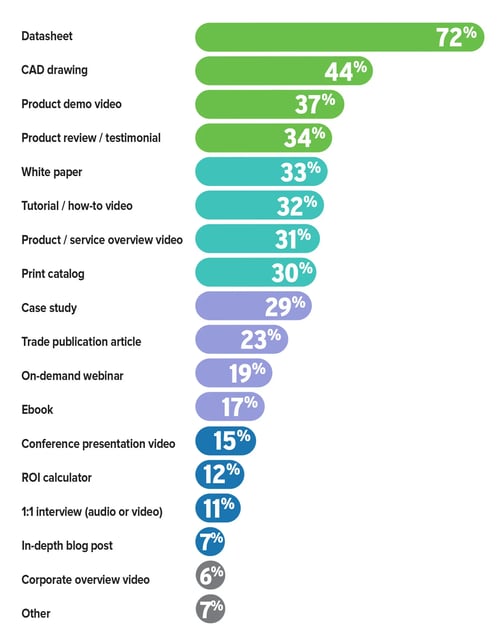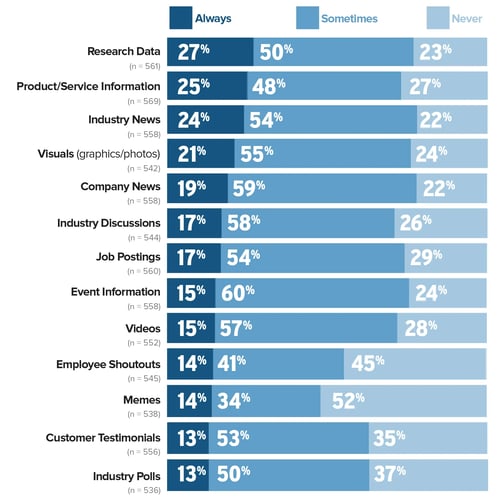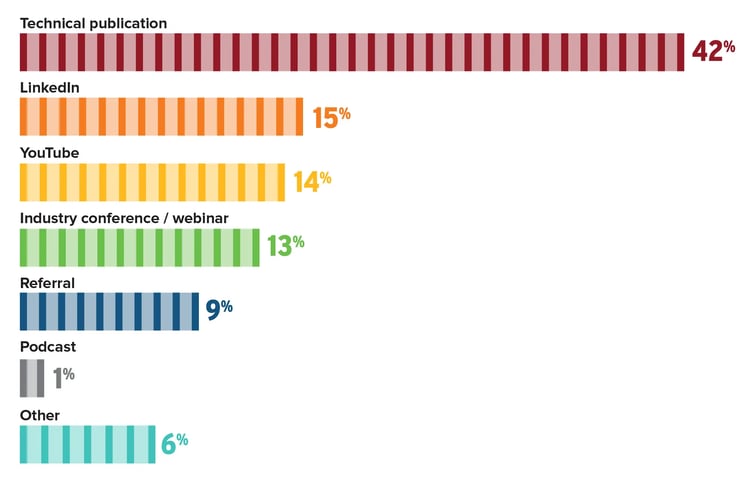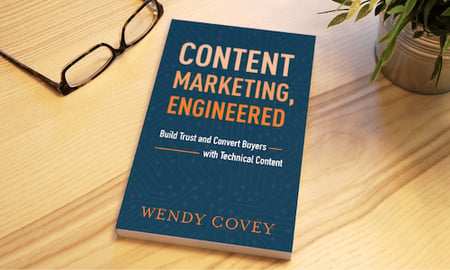Recently, GlobalSpec and TREW Marketing released the 2023 State of Marketing to Engineers research report. As always, we hosted a live webinar to share insights on our recent findings, and approximately 480 marketing, sales and engineering professionals registered to attend.
.webp?width=1000&height=600&name=Q%26A%20from%202023%20State%20of%20Marketing%20to%20Engineers%20Webinar%20(1).webp)
We received many thoughtful questions about how engineers and technical buyers find the information they need to make purchasing decisions.
While we weren't able to answer them all during the webinar, we've combined all the questions into one resource broken down by category.
Understanding Survey Respondent Demographics
What demographic information were respondents asked to share?
Respondents were asked about age, gender identity, background, company size, primary job function, and industry focus. Each demographics question offered an aided list for respondents to select what best described them and their workplace.
Are these global respondents?
Yes, these are global respondents. Here is the breakdown: 51% from North America, 28% from EMEA, 12% from APAC and 8% from LATAM.
Have you thought about breaking out responses to correlate to the industry they belong to?
Yes, we have! You'll see an example of this on page 24 of the research report. In the vast majority of cases, when we analyzed responses by industry, we found that the results were highly similar to the findings as a whole.
Can we get a breakdown of the engineer respondents by title and geography?
To see a breakdown by job title and industry, download the full report.
We plan to release additional demographic breakdowns in the coming months, specifically for the respondents in the European market.
Seeking Answers
The statistic about search results seems to contradict every basic assumption of SEO which says the top result is the most clicked link, and results not on the first search results page (SERP) are irrelevant. Are you suggesting SEO is not an important strategy we should be using?
SEO is definitely important. Your company still needs to show up for those searches, and those top results pages still see the most clicks in this audience. The main difference with engineers and technical buyers is that they will also go deep and look at multiple resources, which means that a ranking on page 2 isn't the equivalent of sudden death like it is for many other industries.
Would you use paid search to promote assets instead?
Paid search provides value in competitive product and service spaces, and can be a good channel for content promotion as well. We've seen success using paid search ads for content on popular topics in a vertical, or items related to something like a new industry standard. For example, we ran an ad for an evergreen webinar on the development of smart cities, and lessons learned from a smart city program. This ad produced a click-through rate (CTR) of greater than 9% due in part to the high level of interest in the impact smart cities can have across public safety and sustainability. The content does need to be on a relatively popular topic, though, since all traffic and downloads depend on a user searching for terms related to that content.
Thoughts on LinkedIn ads over paid Google ads?
Both have value. If you are targeting a specific audience, such as a key account or particular job title, LinkedIn is a better fit. If you are looking for broad brand awareness on a certain topic, Google AdWords would likely be the better choice.
Google ads are a good option when promoting a service with buying intent or a technical topic with a lot of current interest. These ads are successful when you have an audience actively searching for them, and your content or page answers that need.
LinkedIn interrupts the user where they are, so the ad has to be highly relevant and engaging to capture their attention. Think very topical resources and timely events for this channel vs something like a service page or product listing.
I noticed that you didn't ask about Display Ads. High bounce rates are very frustrating and awareness is hard to measure. Any ideas?
The best way to measure display ads is to layer specialized technology on top of them. Understanding performance for awareness-based advertising is a common issue, but thankfully a couple of tools exist that improve targeting and visibility into meaningful metrics on how users are seeing and interacting with your ads. Rollworks is one of these platforms that we recommend, and there are a few other ABM-focused tools that make your advertising smarter all around. There are also a variety of engagement and social listening tools out there to better grasp awareness and share of voice, although they tend to only be available at enterprise prices.
Content Preferences
In your opinion, how much attention should be devoted to events versus digital marketing?
This is a difficult question and one that is specific to the industries and applications you serve. The data is clear that digital marketing (i.e. your website filled with relevant content) is the #1 source for technical buyers. BUT they are also willing to attend some events. Events are quite expensive and once they are over, they don't continue to "give" as digital marketing does. Measure, measure, measure and find the right balance for your company. Don't overlook being "at an event" without a booth through presentations and online posts.
For more insight into in-person events, download the full report.
What's the most effective form of gated content?
Consistent with years past, engineers find content with specific technical detail (e.g., datasheets and CAD drawings) to be the most valuable in their decision-making processes. Secondary to technical documentation, engineers find value in content that provides information on use and implementation (e.g., product demos, reviews, and case studies). This information can be found on page 13.

Are engineers ready to give their contact information to obtain documents or should they be left freely accessible?
If you take a look back at our 2022 State of Marketing to Engineers research report on page 20, you'll see that 83% of engineers are willing to fill out a web form in exchange for meaty technical content. The types of content that were most likely to entice a form submission included white papers, CAD drawings, webinars, in-depth case studies, product configurators and video tutorials.
We opted to not ask this question this year because we haven't seen that data change in a number of years. In past years we found that engineers are willing to give their contact information, as long as it's for the right kind of content.
To see our past findings regarding gated content, access our research archives.
Is it possible to get any kind of contact info without filling out form?
In order to obtain the contact information necessary to interact with and nurture a prospect, an online form is necessary. A form submission can also act as consent to receive communication from your company.
Do you ever ask respondents if they register on manufacturers' websites to access additional documentation or online tools?
We haven't asked a question specifically about registering to access a data library. This would be interesting to consider including in a future research study.
For online publications, do you feel engineers look at digital magazines or online articles?
While we did not specifically ask which elements are favored within a technical publication website (e.g. reading the digital magazine versus jumping straight into online articles), our data shows that technical publication websites and the online articles they contain are favored by technical buyers. 48% of respondents cited online technical publications as a valued resource, and 23% of respondents indicated they find trade publication articles a valuable form of content. Online articles are easy to digest, readily shared, and promote thought leadership.
Can you give some examples of Technical Publications?
There are numerous! A few include:
- Design News
- EE Times
- IEEE Spectrum
- Control Engineering
- Machine Design
- Elektor
- Jane's Defence Weekly
- NASA Tech Briefs
- Photonics Spectra
- Plant Engineering
Newsletters
What are your thoughts on a cadence for regularly automated emails, weekly emails outside of newsletters?
It largely depends on the content that you are pushing out - is it relevant and informative to the groups you're messaging? That may help define how often your email list will be okay with receiving your emails. I would recommend looking at your open and click-through rates for the emails you send to get a sense of how often your users are engaging with your emails.
Social Media and Sharing
Should we be formatting LinkedIn company pages to seem more social-based or keep it technical-based?
Your company pages need to be authentic to your brand. For instance, you may have an approachable casual tone, but also present the company as a deeply technical solutions provider. Your social pages would then be a reflection of this. We do find taking a more conversational "human" approach works well on social, but again shouldn't be jarringly different than your online presence elsewhere.
Do you feel LinkedIn Navigator is in its early stage and therefore the acceptance is low or is it simply not going to be an effective lead generator?
I definitely do NOT think LinkedIn Navigator is in the early stage of adoption at this point. We are seeing a lot of abusive "cold call" type behavior on LinkedIn, which is causing more and more people to ignore messages completely. I'm not suggesting sales ignore it completely, but just like reaching out to a prospect, hold off until they are warm and receptive.
On LinkedIn, do you have any comments on the number of people who view your post versus comment or repost? Are there industry standards?
LinkedIn views and engagement vary widely depending on the number of followers you have, how broadly the post is shared, your brand awareness, and the quality of content. Focus on relevant, educational content, and tag relevant people and companies in your posts. Encourage company leadership to engage with your company posts as well. This will help boost engagement.
LinkedIn seems to be becoming more social with people sharing more personal info, events and opinions. Is there value in forging personal deeper personal connections with customers or perhaps risk alienating someone over something that has nothing to do with the product?
What a great question! Putting on the hat of a technical salesperson, start with a helpful mentality instead of trying to sell a product or solution. Share information as a resource. This might look like posting opinions on threads where you can add value to the conversation and demonstrate expertise. This may be sharing industry research that you found interesting and would be helpful to your prospects. Committing yourself to the platform and interacting with intentionality has proven to be the most successful.
On page 19, we asked respondents what type of content would entice them to stop scrolling on LinkedIn. Research data, product/service information, and industry news were in the top three.

Is it a good idea to use transcriptions of expert interviews, discussion panels, and/or webinars used as long-form articles on LinkedIn (1,600-2,000 words)?
I would say that long-form content within a post might not be the best solution, as someone will likely keep scrolling. I would recommend including a link in your post that leads back to your website where that content can be placed, and include unique and relevant data within the post in order to entice a user to click the link.
However, this would be worth trying if you already have a large and engaged LinkedIn audience looking at you as an influencer on the platform. We see LinkedIn-specific content work best for individuals vs brands, especially those positioned as thought leaders or influencers in their space.
Podcasts
In one of your slides you mentioned that only 1% of technical influencers are found by engineers through podcasts.
73% of engineers listen to podcasts weekly for work (page 25). 1% of engineers discover technical influencers through podcasts (page 22).

Interaction with Sales
What role, if any, do virtual (i.e. Zoom) interactions play in closing sales?
On page 31 of the research report, we asked about the preferred method of communication when first interacting with sales. 7% preferred a video call at this stage in the buyer's journey. This finding doesn't point to what role Zoom interactions play in subsequent sales meetings, however. This would be an interesting area to explore in a future research study.
Analyzing Results
I am wondering how set benchmarks for very niche sectors, and how to articulate that to Leadership. For example, if they ask "How did that press release perform" and I say "Well, 105 people clicked and it was shared by 10 people" how do I respond when they ask "Well can you provide some perspective on how that compares to our industry standards, etc?"
This is tough because every industry is different, especially if you offer a niche product or service with a smaller addressable market. High performance will look vastly different from market to market. I recommend benchmarking your own performance as the best starting point. For instance, of the people that clicked the press release and shared it, what does their journey look like following their engagement? Use that information to set benchmarks for your next press release. You can find industry benchmark data for many digital marketing tactics in the book, Content Marketing, Engineered authored by Wendy Covey (though press release performance is not among them for the reasons above).
How are you able to measure ROI on content?
Calculating an average ROI for B2B content marketing can be tricky. As previously mentioned, it is important to benchmark your performance. It's also important to determine the relevant key performance indicators (KPIs) to measure success.
We recommend creating a marketing scorecard that measures overall marketing health metrics.
While a marketing scorecard may not show you the actual revenue generated from these efforts, it will show you which activities are working the best, which activities you can stop spending time on, and identify any problem areas in marketing that may be preventing you from achieving your goals.
Depending on the system your company uses (i.e. HubSpot, Pardot, Marketo), you can use attribution reports to see which pieces of content are tied to deals or opportunities. This will help determine the revenue generated.
General Research Questions
My previous experience is in e-commerce (B2C). Now that I am working in B2B with a new niche crowd, what do you recommend for rewiring my brain to work with this group and this new consumer journey?
Start with what surprised you most about the research results. A great example would be how deep engineers are willing to go in search. B2C behaviors stop at page 1 on a search results page. Technical buyers and engineers are willing to go deep for credible information! If you get in the mindset of the technical buyer, many are trying to solve complex problems that impact people's lives. They have to do a lot of due diligence. Many team members are involved and buying cycles are long. It's all about understanding your audience and their pain points - get to know your buyer personas, talk to sales, and use that information in your brand's messaging. Whether you're working in B2C or B2B, marketing is simply communicating with your audience.
We market to manufacturing plant managers and maintenance managers. Is there anyone out there that does this type of research for these groups?
While this group has its own unique needs and challenges, engineering-focused research is a great place to start. I'd also suggest reaching out to industry publications that cover your industry such as Plant Engineering.
Is there a difference in the data between marketing to engineers for a product versus a service (consulting/training)?
We did not ask what type of solution the engineer was seeking in this research study so, unfortunately, we don't have a breakdown of data by product versus service. I do think there would be a difference in responses for some questions, such as valued content and why you first choose to interact with sales. We've considered making this distinction but found it difficult to do while striving to keep the survey brief. We will re-examine the idea of this for future research.
Missed the live 2023 State of Marketing to Engineers webinar? Watch the webinar on demand.
To follow along as Wendy Covey and CJ Haight dive into this year's research findings, download the full report.
If you'd like to see how this year's results compare to previous research findings, access our research archives.
TREW is a marketing agency dedicated to reaching engineering and technical audiences through a range of marketing initiatives. Contact us today to learn more about the services we offer.
Subscribe to Our Blog for the Latest Updates
Wendy Covey
 Wendy Covey is a CEO, a technical marketing leader, author of Content Marketing, Engineered, one of The Wall Street Journal’s 10 Most Innovative Entrepreneurs in America, and she holds a Texas fishing record. She resides in a small Hill Country town southwest of Austin, Texas, where she enjoys outdoor adventures with her family.
Wendy Covey is a CEO, a technical marketing leader, author of Content Marketing, Engineered, one of The Wall Street Journal’s 10 Most Innovative Entrepreneurs in America, and she holds a Texas fishing record. She resides in a small Hill Country town southwest of Austin, Texas, where she enjoys outdoor adventures with her family.
About TREW Marketing
TREW Marketing is a strategy-first content marketing agency serving B2B companies that target highly technical buyers. With deep experience in the design, embedded, measurement and automation, and software industries, TREW Marketing provides branding, marketing strategy, content development, and digital marketing services to help customers efficiently and effectively achieve business goals.






 Wendy Covey
Wendy Covey